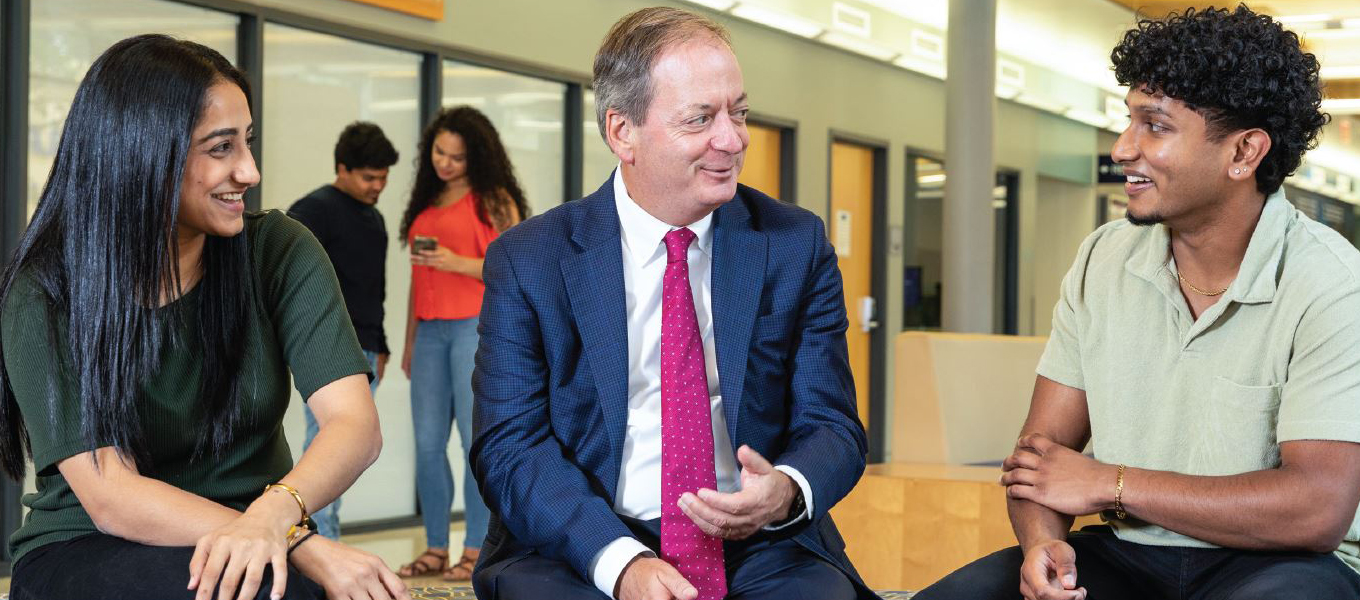
One of the world’s top researchers in the field of real estate is now also on top of the College of Business. William G. Hardin has distinguished himself internationally as a leading scholar on real estate investment, foreclosures, corporate governance and related topics, with more than 75 refereed journal articles over an academic career spanning two decades. Now, he’s bringing the same level of introspection – and action – to the broader goals of FIU Business, after being appointed dean in June 2022.
At the university since 2006, Hardin served as interim dean for a year while continuing his work as the Ryder Eminent Scholar in the Tibor and Sheila Hollo School of Real Estate, of which he was founding director. Previously, he served as director of real estate programs and an associate dean for the Chapman Graduate School of Business.
FIU Business, as well as FIU in general, produces graduates with sought-after skills, and we are located in an area that allows us to embrace a mix of ethnicities, races and cultures. As I talk to people at business schools elsewhere, I see they’re trying to become more like us because they know that bringing together perspectives based on a range of identities and experiences has value in the world of business. To paraphrase what several senior tech investors have said to me, “We appreciate diversity and knowledge of other cultures as that is a competitive advantage.”
Here’s an example of how we have not had to work to keep up but, instead, have been a leader. I was at a meeting several months ago and someone from arguably a top 25 business school explained how excited they were about their first online graduate program. Well, we've been doing that for 25 years! FIU Business started the university’s online educational programs decades ago and has been educating thousands of working professionals, in particular, in a way that has made sense for them. The thing is, we at FIU came by it naturally – as a realization of a need, not as an outgrowth of a historic event that forced everyone’s hand.
FIU’s been an innovator since it started 50 years ago and largely because we’re unfettered by the kind of legacy that, frankly, can stifle innovation. I’ve seen the frustrations at other, older schools that may have high standing, but what are they actually doing? Are they living off the past, or living off the fact that they have all the resources they need? Settled comfortably in terms of enrollments and dollars, they’re going to be the last ones that have to change. We at FIU, on the other hand, embrace change because industry and our region demand it. In fast-paced Miami, we at the College of Business have a mindset of finding what works for our students and what works for businesses in the real world.
We’ve had some talk about whether we need a program in cryptocurrency. Maybe we do, maybe we don’t. The point is that it’s being evaluated. And not in some academic vacuum. We are looking to the future and willing to work across the university, such as interacting with experts in FIU's College of Engineering & Computing and Green School of International & Public Affairs [which offer a range of technical and other courses that could complement such a business program]. Our main concern: How do we ensure that our students get what they need?
Over the next five years, we're going to continue to drive new programs related to changes in the business environment and emerging industries, and not just those in booming South Florida and the rest of the state, but in Latin America, as we have, and well beyond, particularly in Africa, where there are a lot of opportunities.
Looking a little bit further out, I think we will land among the top 50 public business schools. I say that because, already, we’re graduating a very high percentage of students in a timely fashion with the kinds of skills industry is looking for. We are far surpassing other business schools who show off a nice rank but fail to turn out the majority of their students in four years into a waiting economy. To the challenge of taking the college to the upper echelons, I say, bring it on.